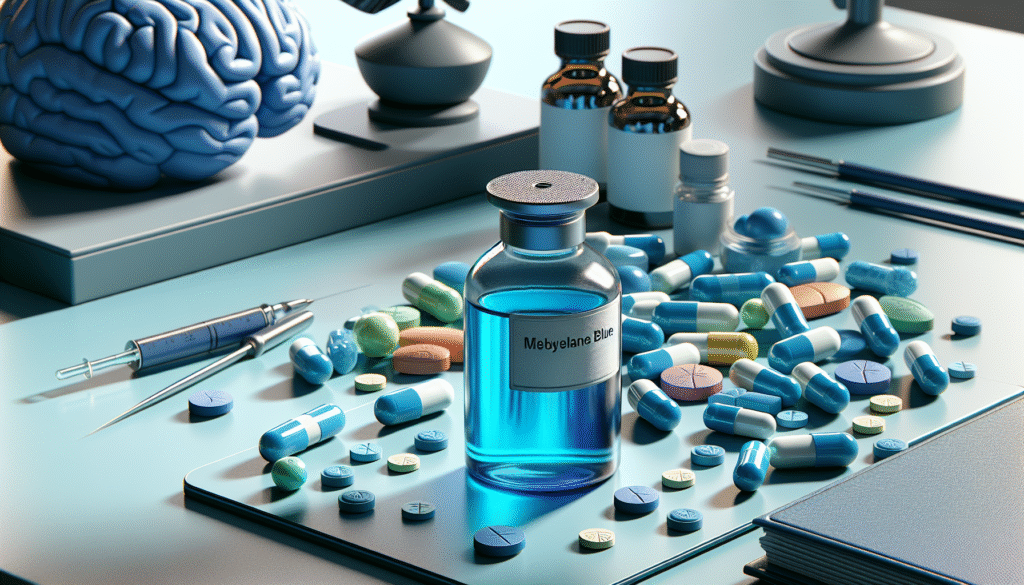
Do you often find yourself seeking ways to enhance your cognitive performance? With the rapid advancement in the field of nootropics and cognitive enhancers, individuals are increasingly exploring their options to boost memory, focus, and overall brain function. Among these options, Methylene Blue has emerged as a noteworthy contender. This article conducts a detailed comparative review between Methylene Blue and various other cognitive enhancers, examining their mechanisms of action, benefits, drawbacks, and overall efficacy.

Understanding Cognitive Enhancers
Cognitive enhancers, often referred to as nootropics, are substances that promise to improve cognitive functions such as memory, creativity, motivation, and executive functions. As a growing segment of both the health and wellness community and the pharmaceutical industry, these substances capture widespread interest. Individuals from students to professionals are keen to discover ways to boost mental performance.
Categories of Cognitive Enhancers
-
Natural Nootropics: These include herbal supplements and dietary substances, such as Ginkgo Biloba, Bacopa Monnieri, and Rhodiola Rosea. They are often touted for their safety and minimal side effects.
-
Synthetic Nootropics: These are manufactured substances, such as racetams (e.g., Piracetam and Aniracetam) and nootropic peptides. They are designed with specific mechanisms to enhance cognitive abilities.
-
Pharmaceuticals: Certain prescription medications, like Adderall and Modafinil, are used off-label for cognitive enhancement. While effective, they come with associated risks and side effects.
The Rise of Methylene Blue
Methylene Blue, originally developed as a dye and later used in medicine, has gained traction as a cognitive enhancer in recent years. It is a synthetic compound with a long history of use in treating conditions such as methemoglobinemia. Researchers have begun investigating its potential neuroprotective and cognitive-enhancing properties.
The Mechanism of Action of Methylene Blue
Methylene Blue operates primarily through two key mechanisms: enhancing mitochondrial function and acting as a neuroprotective agent. Understanding these mechanisms is essential for comprehension of its cognitive-enhancing effects.
Enhancement of Mitochondrial Function
Mitochondria are the powerhouses of the cell, responsible for generating adenosine triphosphate (ATP), the energy currency of the cell. Methylene Blue facilitates the transfer of electrons in the mitochondrial electron transport chain, thereby increasing ATP production. This enhanced energy availability is believed to support enhanced cognitive function, facilitating improved focus and mental clarity.
Neuroprotective Properties
Research indicates that Methylene Blue exhibits neuroprotective effects, reducing oxidative stress and inflammation in neuronal cells. By lowering these detrimental factors, Methylene Blue may prevent cellular damage, support brain health, and promote cognitive longevity.
Comparing Methylene Blue to Other Cognitive Enhancers
When evaluating cognitive enhancers, it is crucial to understand how Methylene Blue stacks up against its counterparts. The following sections offer a comparative analysis of Methylene Blue with other widely used cognitive enhancers.
Methylene Blue vs. Natural Nootropics
Benefits of Natural Nootropics
Natural nootropics, such as Ginkgo Biloba and Bacopa Monnieri, are often seen as safer alternatives to synthetic counterparts. They may support cognitive function through various mechanisms, including improving blood flow to the brain and enhancing neurotransmitter signaling.
Limitations of Natural Nootropics
Despite their benefits, natural nootropics may also come with challenges. Their effects can be subtler and may take longer to manifest compared to synthetic substances. Additionally, research supporting their efficacy is often less robust.
Comparative Table: Methylene Blue vs. Natural Nootropics
| Feature | Methylene Blue | Natural Nootropics (e.g., Ginkgo Biloba, Bacopa Monnieri) |
|---|---|---|
| Mechanism of Action | Enhances mitochondrial function and neuroprotection | Improves blood flow and neurotransmission |
| Onset of Action | Rapid | Often gradual |
| Efficacy | Strong evidence for cognitive enhancement | Variable evidence; effects can differ by individual |
| Safety Profile | Generally safe with proper dosing | Generally safe but can have side effects for some individuals |
| Longevity of Benefits | Potentially long-lasting | May require consistent use for sustained effects |
Methylene Blue vs. Synthetic Nootropics
Benefits of Synthetic Nootropics
Synthetic nootropics such as Modafinil and Racetams have gained popularity for their rapid cognitive boosting effects. They often provide immediate enhancement in attention, memory, and executive function.
Limitations of Synthetic Nootropics
However, the drawbacks include potential side effects, dependence, and a range of legal and ethical considerations. Many synthetic nootropics can lead to adverse reactions, including insomnia, anxiety, and cardiovascular concerns.
Comparative Table: Methylene Blue vs. Synthetic Nootropics
| Feature | Methylene Blue | Synthetic Nootropics (e.g., Modafinil, Piracetam) |
|---|---|---|
| Mechanism of Action | Enhances mitochondrial function and neuroprotection | Varies by substance; often increase neurotransmitter levels |
| Onset of Action | Rapid | Typically fast-acting |
| Efficacy | Strong cognitive enhancement potential | Prominent short-term effects |
| Safety Profile | Generally safe with proper dosing | Can cause dependency and various side effects |
| Longevity of Benefits | Potentially long-lasting | Immediate effects, often short-lived |
Methylene Blue vs. Pharmaceuticals
Pharmaceutical cognitive enhancers are often prescribed for specific conditions but are increasingly used recreationally for cognitive enhancement. Medications like Adderall improve focus and concentration significantly but carry the risk of misuse.
Benefits of Pharmaceuticals
When used appropriately, pharmaceuticals can produce substantial increases in cognitive function. They target specific neurotransmitter systems, often leading to improved attention and reduced fatigue.
Limitations of Pharmaceuticals
Despite their effectiveness, pharmaceuticals have severe side effects and dependency issues. The misuse of such substances can lead to adverse health outcomes and ethical dilemmas in academic and professional settings.
Comparative Table: Methylene Blue vs. Pharmaceuticals
| Feature | Methylene Blue | Pharmaceuticals (e.g., Adderall, Modafinil) |
|---|---|---|
| Mechanism of Action | Enhances mitochondrial function and neuroprotection | Targets neurotransmitter systems |
| Onset of Action | Rapid | Typically rapid |
| Efficacy | Potentially significant | Very effective for specific conditions |
| Safety Profile | Generally safe with proper dosing | High potential for misuse and side effects |
| Longevity of Benefits | Potentially long-lasting | Effects often diminish after use |
Efficacy of Methylene Blue in Cognitive Enhancement
To determine the effectiveness of Methylene Blue as a cognitive enhancer, one must look at existing research and anecdotal reports. Studies suggest that Methylene Blue can lead to improved memory, focus, and overall cognitive performance, though individual responses may vary.
Evidence from Research Studies
-
Cognitive Improvement in Older Adults: A study indicated that Methylene Blue improved memory function in older adults with mild cognitive impairment. Participants demonstrated better performance in memory tasks during the treatment phase.
-
Neuroprotective Effects: Research has shown that Methylene Blue can reduce neuronal cell death in models of neurodegeneration, which could have implications for cognitive decline.
-
Psychological Effects: Anecdotal evidence supports claims of enhanced focus and energy, with individuals noting improved productivity and mental clarity after using Methylene Blue.
Individual Variation in Response
While there is promising evidence regarding the cognitive-enhancing properties of Methylene Blue, responses can differ among individuals due to genetic factors, health status, and the presence of other medications or supplements.

The Safety Profile of Methylene Blue
Evaluating the safety profile of any cognitive enhancer is essential. Methylene Blue is generally considered safe when used at recommended dosages, but certain risks and side effects should be understood.
Common Side Effects
While most users tolerate Methylene Blue well, potential side effects may include:
- Mild gastrointestinal discomfort.
- Headaches.
- Skin discoloration (due to its dye properties).
Contraindications
Methylene Blue can interact with various medications, particularly those affecting serotonin levels, and can potentially cause serious reactions. It is essential to consult a healthcare provider before beginning any supplementation regimen.
Making an Informed Decision
When it comes to choosing a cognitive enhancer, you must weigh the benefits and risks associated with each option. Methylene Blue presents promising advantages over other cognitive enhancers, but it may not be suitable for everyone.
Consider Your Goals
Clarifying your cognitive enhancement goals is the first step. Are you seeking long-term neuroprotection, immediate focus, or a balance of both? Your goals will help dictate which cognitive enhancer is best suited for you.
Consult a Healthcare Professional
Before initiating Methylene Blue or any other cognitive enhancer, consult with a healthcare professional to assess your individual circumstances and any potential interactions with existing medications or health conditions.
Monitor Your Experience
Should you decide to use Methylene Blue, keeping track of your experiences through journaling or regular assessments can provide insights into its effectiveness for your cognitive needs.
Conclusion
Methylene Blue stands out as an intriguing and potentially effective cognitive enhancer alongside its synthetic and natural counterparts. Its unique mechanisms foreshadow a promising avenue for those seeking to improve their cognitive performance. However, the decision to use any cognitive enhancer should be undertaken thoughtfully, balancing benefits against potential risks and individual health needs. Embracing informed decision-making will empower you to optimize your cognitive function in a way that best aligns with your health and performance goals.